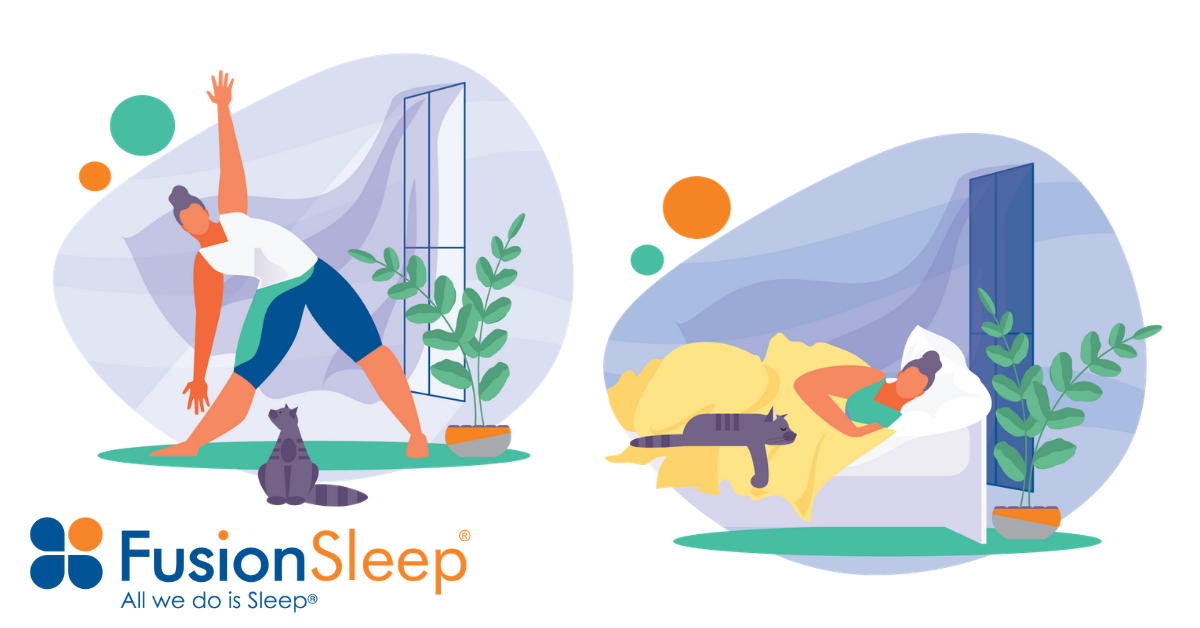Exercise Your Way to a Better Night's Sleep (No, Really!)
We already know that exercise benefits our body in many ways and can help reduce our risk of cardiovascular disease and other chronic health conditions like hypertension and type 2 diabetes.
But did you know that exercise can improve your quality of sleep?
Exercise has been shown to improve the quality of sleep. People who exercise regularly have lower risk of short sleep time (<6 hours), sleep disturbances, and better sleep efficiency when measured in the lab.
Clinical research has shown us that patients who report regular physical activity also report better quality sleep and an easier time falling asleep.
How does exercise improve sleep?
• Improves mood
» Exercise has been shown to improve mood, decrease levels of anxiety and depression and be a critical tool for stress-relief.
» These processes are important in the natural process of falling asleep, as we know that anxiety and depression can be closely linked to insomnia.
• Thermoregulation theory
» Exercise increases our core temperature. After exercise is complete, our temperature drops. This drop in temperature can help signal the body that it is time to fall asleep.
• Exposure to sunlight during physical activity
» Improves Vitamin D levels – vitamin D deficiency has been linked to a higher risk of sleep disorders. Sunlight exposure also stimulates the release of melatonin, a sleep promoting hormone.
What types of exercise should I do to improve sleep?
• Aerobic activity has been shown to improve sleep efficiency, increase sleep duration, and decrease the time it takes to fall asleep. Consider Zumba, brisk walking, jogging or circuit training.
• Resistance training has also been studied and found to improve sleep efficiency and specifically decrease wake after sleep onset (WASO).
• Yoga, meditation, and other mindfulness practices have been found to be greatly beneficial for sleep. Yoga decreases time to fall asleep, anxiety, stress and improves mood, which can all lead to better sleep.
How often and how much exercise should I get for sleep improvement?
• Moderate-vigorous intensity aerobic exercise such as jogging, running, Zumba, etc. are recommended at 30 minutes per day or 150-minutes per week.
• Some exercise is better than none at all! Consider breaking up your movement for the day into multiple short workouts of 10-15 minutes to help meet your movement goal.
What time of day is best to exercise?
Traditionally, we have all been told to avoid strenuous exercise too close to bedtime as it can make it harder to go to sleep. Why is this?
• Exercise releases endorphins, and these chemicals in the brain can make it harder for some people to fall asleep.
• If done too close to bedtime, it can make it harder to fall asleep due to exercise increasing the body’s core temperature. Remember: it takes time for the body’s temperature to return to it’s normal temperature.
• Exercise in the morning to mid-afternoon has been shown to benefit sleep by improving circadian rhythm, making it easier to fall asleep and stay asleep by increasing slow-wave sleep.
Exercise can help normalize circadian rhythms
• New research has shown that exercise can be used to re-train our bodies to a normal sleep-wake cycle and reduce risks associated with circadian rhythm disorders.
• Exercise timed at a specific time of day can shift the onset/offset of things like melatonin (the sleep hormone), thyroid stimulating hormone, and core body temperature.
Exercise can improve insomnia symptoms in some patients
• Several studies have demonstrated that exercise can improve subjective reports of sleep quality for some patients with chronic insomnia. Aerobic exercise regimens for patients with chronic insomnia have been shown to improve sleep quality by lowering the time it takes to fall asleep.
• Remember that insomnia is a complex sleep disorder that requires an evaluation by a sleep specialist to rule out any underlying sleep issues or medical concerns that could be contributing to insomnia symptoms
Kayla Lunn MSN, APRN, FNP-C Kayla is an alumni of the University of Georgia and Medical College of Georgia. She most recently worked as a Family Nurse Practitioner treating patients of all ages in primary care. With her gift for learning (Kayla graduated magna cum laude from Georgia College & State University in 2018) and her range of treating multi-generational patients, Kayla compliments the depth of our provider team.



